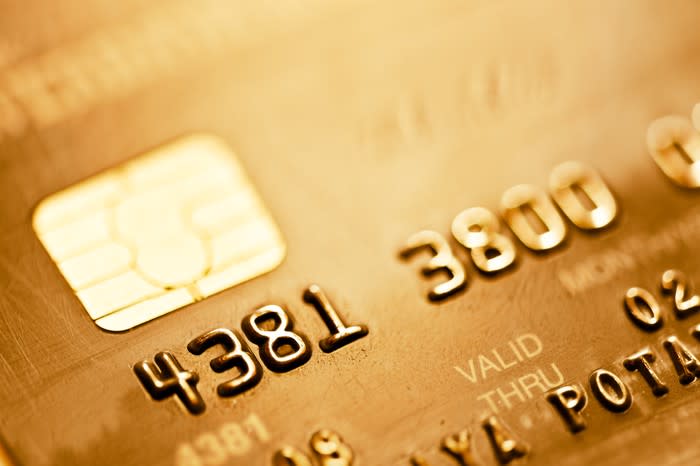Mastercard Credits Key Acquisitions For Recent Wins
Mastercard (NYSE: MA) provides the payment rails for money to travel from its cardholders' accounts to merchants' accounts every time one of its cards is used to make a purchase or pay a bill. By doing this without taking on any credit risk -- leaving that to the card-issuing financial institutions -- Mastercard consistently produces robust top- and bottom-line growth with high operating margins, leading it to S&P 500-crushing returns over the trailing one-, five-, and 10-year periods.
When the company reported its 2019 second-quarter results, the excellence continued. Revenue rose to $4.11 billion, a 12% increase year over year, and adjusted earnings per share grew to $1.89, a 14% increase over last year's second quarter. The strong revenue and earnings growth were driven by a 6% increase in cards in circulation and an 18% growth in switched transactions, the number of times Mastercard products were used.

Mastercard's new acquisitions are giving the company new capabilities and an extended reach. Image source: Getty Images.
Winning with acquisitions
Beyond the advantages Mastercard's business model creates, CEO Ajay Banga also credits several acquisitions the company has made in recent years for driving growth. During the conference call, he said, "I would say most of our acquisitions, even over the past few years, have been platform-oriented, or in a couple of cases oriented toward skill sets we didn't have. ... So we can add into what we have and then sell as a bundled service in our system."
Let's take a closer look at some recent acquisitions that Banga called out this quarter.
1. Vocalink
Vocalink provides real-time ACH (automated clearing house) payments to banks and financial institutions. Mastercard acquired the London-based fintech company in early 2017 for $920 million. In the second quarter, Vocalink was given credit for another large partnership with a network of financial institutions in Scandinavia. Banga said:
First, we recently announced a partnership with P27 Nordic Payments Platform, owned by six of the largest banks in the Nordics to provide a leading-edge real-time and batch multicurrency payment platform across the region. This new platform leverages our Vocalink assets [and] will replace the existing payments infrastructure and provides instant and secure payments across the region.
In the press release announcing the partnership, Mastercard said the partnership would lower costs and provide instant payments across multiple countries and currencies, the first in the world of its kind . Without Vocalink's capabilities, it seems that such a system would not have been possible.
2. Transfast
Earlier this year, Mastercard and Visa (NYSE: V) entered a bidding war for Earthport, a fintech company that enables cross-border payments between 87 different countries. After Visa finalized the deal, Mastercard shifted gears and acquired Transfast, another company in the cross-border-payments space.
A cross-border payment transaction takes place when the buyer's and seller's banks are located in two different countries. For instance, when American tourists fly to London and purchase Big Ben souvenirs, they participate in cross-border payments. Cross-border payments are a huge business, with e-commerce, international remittance payments, tourism, and global business transactions reaching as much as $22 trillion in 2015.
Transfast gives Mastercard the ability to reach 90% of the world's population and "provides a suite of leading compliance, FX, messaging and licensing capabilities to address many of the cross-border pain points that exist today." With Transfast's cross-border solutions, Mastercard was able to enter into a partnership with Interac, a Canadian debit network, that allows Bank of Canada account holders to send money internationally.
3. Brighterion and NuData Security
Many of Mastercard's acquisitions create new capabilities for the company, which it can then bundle in its "other revenues" segment, which grew to $962 million this quarter, a 23% increase year over year. This division collectively accounts for services Mastercard offers financial institutions and merchants, such as data analytics and fraud protection. Not only do these services contribute to Mastercard's bottom line, they also create a deeper relationship with the financial institutions it serves.
The best part is that much of this revenue is not one-time, but recurring, because "it involves the selling of AI and other products that are sold into banks and merchants and governments in a way that they tend to have reutilization quarter-after-quarter," Banga said. The revenue Mastercard sees from these services is based on the payment volumes they are used for.
Both Brighterion and NuData are now accounted for in this segment. Brighterion is an AI-powered solution that helps financial institutions combat fraud and comply with regulations, while NuData uses passive biometrics to create digital identities for users. With the Brighterion and NuData acquisitions, Banga said, Mastercard now sees 55% to 56% of its transactions, when it used to be "40-something percent."
More than a numbers game
Some might like Mastercard's acquisitions because they are always accretive to earnings after the first or second year, which is a pillar of its acquisition philosophy, according to Banga. Others might not like the acquisitions because the margins will inevitably be lower than the company's core business. Both of these observations are missing the larger point.
Mastercard's acquisitions help it win new deals and keep existing clients when contracts expire. If a regional bank is using Mastercard's supplemental services to manage its loyalty program and prevent fraudulent transactions, it is not likely to switch to a competitor when its agreement with Mastercard expires. Conversely, Mastercard is able to shop itself to potential customers by pointing to its extra capabilities. This growth hook, when combined with its strong growth and eye-popping margins, makes it extremely likely that Mastercard's market-beating returns will continue for some time to come.
Matthew Cochrane owns shares of Mastercard. The Motley Fool owns shares of and recommends Mastercard and Visa. The Motley Fool has a disclosure policy.
This article was originally published on Fool.com

 Yahoo Finance
Yahoo Finance 